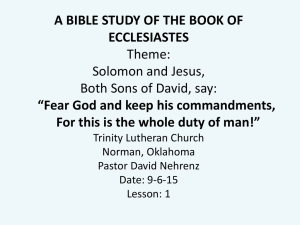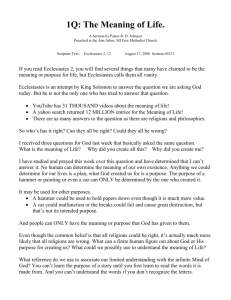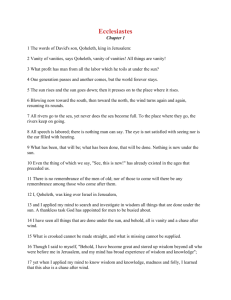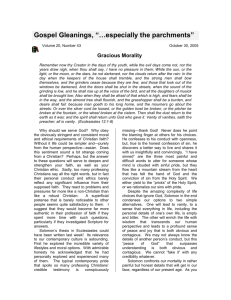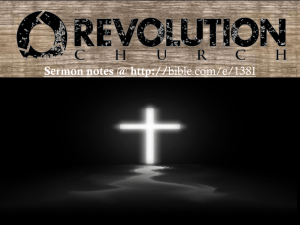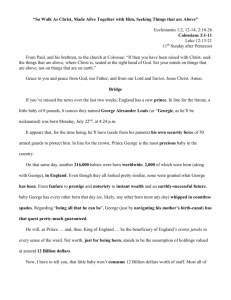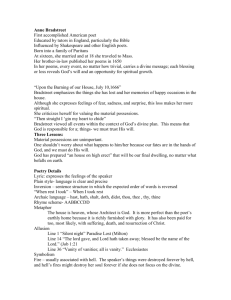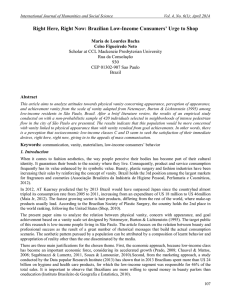Ecclesiastes-Lesson-11-Vanity-of-Vanities-Is-All
advertisement
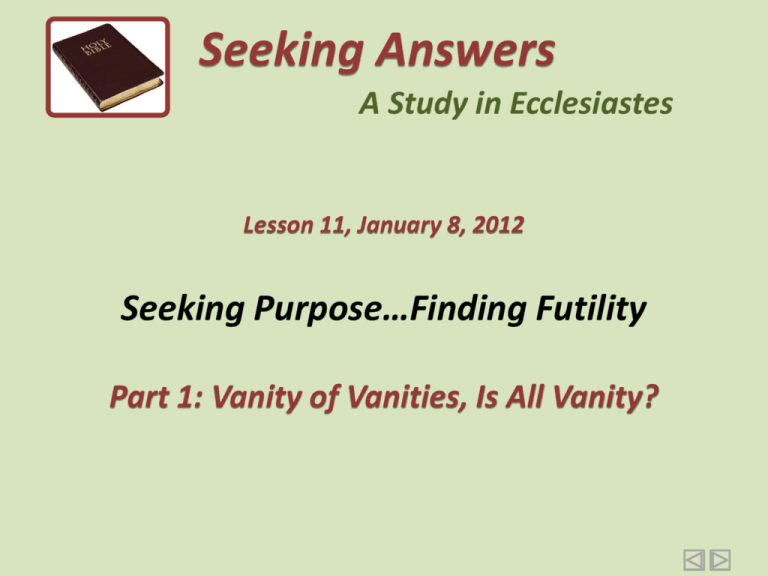
Seeking Answers A Study in Ecclesiastes Lesson 11, January 8, 2012 Seeking Purpose…Finding Futility Part 1: Vanity of Vanities, Is All Vanity? Today’s Scripture Ecclesiastes 1: 1-6 The words of the Preacher, the son of David, king in Jerusalem. Vanity of vanities, saith the Preacher, vanity of vanities; all is vanity. What profit hath a man of all his labour which he taketh under the sun? One generation passeth away, and another generation cometh: but the earth abideth for ever. The sun also ariseth, and the sun goeth down, and hasteth to his place where he arose. The wind goeth toward the south, and turneth about unto the north; it whirleth about continually, and the wind returneth again according to his circuits. Today’s Scripture Ecclesiastes 1:7-11 All the rivers run into the sea; yet the sea is not full; unto the place from whence the rivers come, thither they return again. All things are full of labour; man cannot utter it: the eye is not satisfied with seeing, nor the ear filled with hearing. The thing that hath been, it is that which shall be; and that which is done is that which shall be done: and there is no new thing under the sun. Is there any thing whereof it may be said, See, this is new? it hath been already of old time, which was before us. There is no remembrance of former things; neither shall there be any remembrance of things that are to come with those that shall come after. Thought for Today Human life is everywhere a state in which much is to be endured, and little to be enjoyed. -- Samuel Johnson (1759) The ultimate result of shielding men from the effects of folly is to fill the world with fools. -- Herbert Spencer, -- ?????? English Philosopher (1820-1903)) "Solomon has put the key to Ecclesiastes right at the front door: 'Vanity of vanities, saith the Preacher, vanity of vanities; all is vanity. What profit hath a man of all his labor which he taketh under the sun?' (1:2-3). Just in case we missed it, he put the same key at the back door (12:8).“ Thomas Constable, Notes on Ecclesiastes, 2010 To understand the message of Ecclesiastes, we must consider: The meaning and usage of the English word “vanity” which was translated from the Hebrew word “hebel” “ ... [the Holy Spirit] deliberately chose a word [the Hebrew word ‘hebel’] with a calculated ambiguity; [the Holy Spirit through Solomon] skillfully employed it in a variety of contexts so that several associated meanings could be communicated without the use of synonyms ... For [Solomon] ‘hebel’ is a neutral term expressing brilliantly in its figurative nuances, the limitations of human activity and human wisdom” -- R. Cover, “Vanity in Ecclesiastes,” Th. M Thesis, Dallas Theological Seminary, 1978, p.76. Synonym Verses Subject Antonym profitless 2:1; 2:15 pleasure or wisdom profitable perplexing or enigmatic 6:2; 8:10; 8:14 observations “under the sun” contradict established moral order solution or solvable transient or fleeting 11:10; 6:12; 7:6; 9:9; 3:19 man’s life permanent futile 1:2; 12:8; 2:19, 21, 23; 7:6 events under the sun, laughter of fools, and leaving an estate to heirs fruitful unknown or obscure 6:1-4; 11:8 to a stillborn child or to death well-known • • • • • • • • • • • • • • • • • absurd/absurdity anxious breath-like empty/emptiness enigmatic ephemeral fleeting foolishness/folly frailty fruitless futile impermanent insignificant intransigent joyless limited meaningless/meaninglessness • • • • • • • • • • • • • • • • • nothingness obscure paradox perplexing pointless profitless substance-less transient transitory unbeneficial unfulfilling unknown unsatisfying uselessness valueless vapor worthless/worthlessness • • • • • • • • • • • • • • • • • • • abiding accomplished/accomplishment advantage (“that which matters"; "that which counts“) beneficial fulfilling gain good (more recently "point“) joy known meaningful permanent profit/profitable (Hebrew word for profit = "left over“) satisfying significant strength substance tranquil useful valuable • • • • • • • • • • • • • • • • • • • • Matthew 6:7 Matthew 16:26-27 Mark 7:7 Luke 12:15-28 John 3:8 Acts 4:25 Romans 1:21 Romans 8:20 1 Corinthians 1:20-21 1 Corinthians 3:20 Ephesians 4:17 Ephesians 5:6 1 Timothy 1:6 1 Timothy 6:20 2 Timothy 2:16 Titus 1:10 Titus 3:9 James 1:26 1 Peter 1:18 2 Peter 2:18 To understand the message of Ecclesiastes, we must consider: The meaning and usage of the English word “vanity” which was translated from the Hebrew word “hebel” The meaning and usage of the word “All” “It must be emphasized that [Solomon] nowhere uses ‘hebel’ pejoratively or with morally negative connotations.” -- R. Cover, “Vanity in Ecclesiastes,” Th. M Thesis, Dallas Theological Seminary, 1978, p.76. “All” in “All is vanity…” does not mean everything in the Universe: Solomon’s observations and conclusions are limited in their scope to “under the sun” Solomon’s seemingly negative conclusions always grow out of observations of the senses (“I saw…”, “I have seen”, etc) Solomon never speaks of God, God’s work, God’s revelation, or man as God’s creature as being “vanity” Solomon commends some things as having merit in life “under the sun” such as the fear of God, enjoyment of life, and proper use of wisdom
